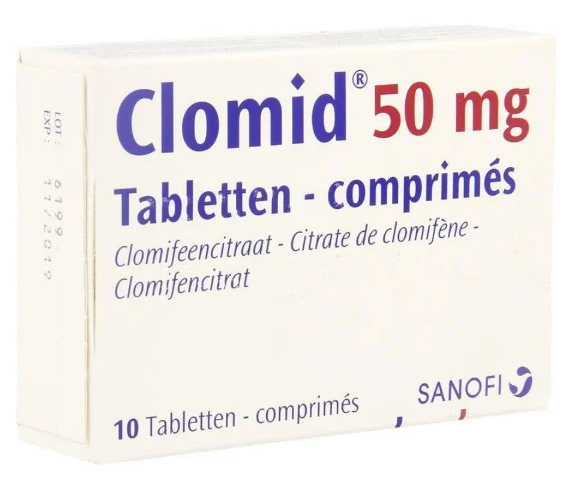Index
Introduction
In the landscape of modern medicine, the pursuit of effective and safe treatments is a constant. Advances in understanding the human body have led to remarkable discoveries, including the use of drugs that were originally intended for one purpose but ended up finding applications in entirely new areas. One such drug is clomiphene, which has gained attention as a potentially beneficial treatment for certain conditions in men. But what exactly is clomiphene used for in men?
Clomiphene: An Overview
Clomiphene is a drug that has been on the market for several decades, primarily used in the treatment of fertility issues in women. The main objective of clomiphene is to induce ovulation in women who, for some reason, cannot ovulate adequately or regularly. It is classified as a Selective Estrogen Receptor Modulator (SERM), meaning it has the ability to bind to estrogen receptors in the body and block their action. This stimulates the release of certain hormones that drive ovulation.
Applying Clomiphene in the Male Universe
Although clomiphene is well-known for its use in women, researchers have found that the drug can also have useful applications for men. Since clomiphene acts by blocking the action of estrogen, this can lead to the release of hormones beneficial for men, especially regarding testosterone and sperm production. This makes clomiphene a potential treatment option for men with low testosterone levels and/or fertility issues.
Clomiphene for Male Fertility
Infertility is an issue affecting many couples, and male fertility problems contribute to roughly half of these cases. For men with a low sperm count or suboptimal sperm quality, clomiphene may be a treatment option. The drug can help stimulate sperm production and, consequently, improve the chances of conception.
Clomiphene for Low Testosterone Levels
Low testosterone levels can have a significant impact on a man’s quality of life, leading to symptoms like fatigue, loss of muscle mass, low libido, and mood swings, among others. Clomiphene is one of the potential treatments for this condition, as it can help boost the body’s testosterone production. Unlike other testosterone replacement therapies, clomiphene does not diminish the body’s ability to produce its hormone, which is a significant advantage.
Important Considerations Regarding Clomiphene Use in Men
It’s crucial to understand that while clomiphene may offer benefits for men, it’s a drug that should be used under medical guidance. Each person is unique, and what works well for one individual might not work the same way for another. Furthermore, although clomiphene is generally considered safe, it can cause side effects in some men. That’s why medical consultation is essential before starting any new medication.
The continued exploration of clomiphene and its potential role in treating male issues is a testament to medicine’s commitment to finding solutions for health problems affecting men. As we continue to expand our knowledge and understanding of available drugs, we can expect to see even more innovations and breakthroughs in this field. In the next subsection, we will delve deeper into clomiphene’s mechanism of action in men and how it works in the body to produce its effects.
What is Clomiphene?
Clomiphene is a drug primarily used to treat infertility in women. However, recently, doctors have discovered that this medication can also benefit men. But before we delve deeper into this, let’s understand more thoroughly what clomiphene is, how it works, and its history in medicine.
A Brief History of Clomiphene
Clomiphene, also known by its most common trade name, Clomid, is a medication that has been in use for several decades. It was first approved for use in the United States by the Food and Drug Administration (FDA) in 1967. At the time, clomiphene’s primary indication was for the treatment of women who had difficulty ovulating. Over the years, clomiphene has become one of the most common treatment options for female infertility.
Clomiphene and Female Infertility
The main role of clomiphene in treating female infertility is to stimulate ovulation. The drug accomplishes this through its action as a Selective Estrogen Receptor Modulator. Essentially, clomiphene “tricks” the body by blocking estrogen receptors, making the brain believe estrogen levels are lower than they truly are. This prompts the brain to produce more of the follicle-stimulating hormone (FSH) and luteinizing hormone (LH), which in turn stimulate the ovaries to release an egg. This is particularly useful for women who do not ovulate regularly or who have irregular menstrual cycles.
Beyond Female Infertility: Clomiphene and Men
While clomiphene was initially developed for women, researchers found that the drug can also have applications for male health. Just as in women, clomiphene’s action to stimulate the release of FSH and LH also affects men. Specifically, LH is crucial for testosterone production in the testicles. Therefore, in theory, clomiphene can be used to treat conditions where there’s a testosterone deficiency. Additionally, FSH is vital for sperm production, meaning clomiphene might also play a role in treating male infertility.
What is the Purpose of Clomiphene for Men
The use of clomiphene in men marks a significant advancement in reproductive medicine. Despite its more common use in women to stimulate ovulation, recent research has unveiled the potential of clomiphene as an effective treatment for certain male conditions, specifically infertility and low testosterone production.
Clomiphene in the Treatment of Male Infertility
Male infertility is an issue affecting many men and their partners. In many cases, it’s caused by inadequate sperm production or poor-quality sperm. Clomiphene, due to its ability to stimulate the release of the follicle-stimulating hormone (FSH) and luteinizing hormone (LH), can be utilized to enhance sperm production.
FSH plays a pivotal role in sperm production, while LH is necessary for testosterone production, a vital hormone for male reproductive function. By prompting the release of these hormones, clomiphene can assist in improving fertility in men with low or non-existent sperm counts.
Clomiphene and Hypogonadism
Hypogonadism is a condition characterized by low testosterone levels. It can result in various symptoms, including muscle mass loss, weight gain, fatigue, depression, and decreased libido. Clomiphene is believed to be effective in treating hypogonadism by prompting the body to produce more testosterone.
Unlike many other testosterone replacement therapies, which directly provide testosterone and might cause the body to cease producing its own hormone, clomiphene stimulates the body to produce more testosterone on its own. This could make it a preferred treatment option for some men, especially those still wishing to have children since other testosterone replacement therapies can decrease sperm counts.
Considerations on Clomiphene Use in Men
Despite its potential benefits, it’s crucial to remember that clomiphene might not be suitable for all men. In some cases, it may not be effective, or side effects may occur. Moreover, clomiphene is currently approved by the FDA for use in women and not in men, meaning its use in men is considered “off-label”. Thus, it’s vital that any clomiphene use in men is overseen by a physician.
How Clomiphene Works in Men
Clomiphene is a complex medication, and its mechanism of action is quite intriguing. Acting as a selective estrogen receptor modulator (SERM), it exerts its effects in ways that might seem contradictory at first glance. However, by examining how clomiphene operates in the male body, we’ll understand why this drug has become such a valuable tool in treating certain male disorders.
Clomiphene as a SERM
A SERM is a substance that binds to estrogen receptors, mimicking the action of this hormone in some parts of the body and blocking it in others. In the case of clomiphene, it deceives the body by blocking estrogen receptors in the brain. As a result, the brain believes estrogen levels are low.
The significance of this is tied to the fact that the body tries to maintain a careful balance between estrogen and testosterone levels. When the brain perceives low estrogen levels, it responds by increasing the production of two hormones: luteinizing hormone (LH) and follicle-stimulating hormone (FSH).
The Importance of LH and FSH in Male Health
LH and FSH are vital for male reproductive health. LH stimulates testosterone production, while FSH is crucial for sperm production. By inducing the brain to release more of these hormones, clomiphene can potentially enhance testosterone and sperm production in men.
This is particularly pertinent for men with infertility or low testosterone levels. By boosting the production of these hormones, clomiphene can assist in treating these conditions.
Clomiphene: An Effective Treatment for Low Testosterone and Infertility
Being a SERM, clomiphene offers a unique approach to treating low testosterone and infertility. Unlike testosterone replacement therapy, which directly supplies the hormone to the body (which can halt the natural production of testosterone and sperm), clomiphene encourages the body to naturally produce more of these hormones.
This distinctive feature of clomiphene makes it an attractive treatment option, especially for men wishing to maintain fertility.
Side Effects and Risks
Like any medication, clomiphene comes with its list of potential side effects. While most men tolerate it well, it’s important to be aware of these potential side effects in order to make an informed decision and know what to expect from the treatment.
Common Side Effects of Clomiphene in Men
Some of the more common side effects of clomiphene include weight gain, mood changes, dizziness, and blurred vision. Additionally, some men may experience nausea, vomiting, breast tenderness, insomnia, acne, or skin rashes. These side effects are generally mild and often fade over time as the body adjusts to the medication.
Severe Side Effects of Clomiphene in Men
Though less common, there are some more serious side effects that can occur with clomiphene use. These include serious vision problems, severe abdominal pains, testicle enlargement, and rarely, a condition called hypergonadism, where there is an overproduction of sex hormones.
Any of these side effects should be considered a medical emergency. If a patient is taking clomiphene and experiences any of these symptoms, they should seek medical attention immediately.
Risks Associated with Clomiphene Use in Men
In addition to side effects, there are also some risks associated with clomiphene use. One of these risks is the possibility of a condition called gynecomastia, which is the abnormal growth of breasts in men. While this is rare, it can occur in some cases.
Another risk is the possibility of developing ovarian cysts in women when clomiphene is used to stimulate ovulation. However, this risk does not apply to men.
The Importance of Medical Guidance
It’s vital to highlight the importance of medical guidance when considering the use of clomiphene. While this drug has proven effective for many men, it’s not suitable for everyone. An experienced physician, such as a urologist, can help evaluate whether clomiphene is the most appropriate treatment for each man’s individual condition.
Conclusion
Medicine is a constantly evolving field, and it’s rewarding to see how advancements in medical treatment are broadening options for patients with various conditions. The use of clomiphene in men is a testament to this. Once a drug mainly intended to treat infertility in women, clomiphene now offers a new possibility for men facing similar challenges.
The Potential of Clomiphene for Men
Clomiphene has shown significant potential as a treatment for infertility issues and low testosterone levels in men. By blocking estrogen receptors in the brain, clomiphene leads to an increase in hormone production that stimulates testosterone and sperm production, offering an alternative to traditional hormone replacement treatments.
Tailoring the Treatment
However, it’s essential to remember that each patient is unique. Every man has his medical history, symptoms, and treatment goals. Therefore, while clomiphene might be an effective option for many, it might not be the right choice for everyone. A comprehensive medical assessment, including physical and laboratory tests, is necessary to determine the most appropriate treatment approach.
The Crucial Role of the Physician
This is where the role of a qualified healthcare professional becomes crucial. If you are considering clomiphene as a treatment option, it’s vital to discuss it with your doctor. He or she can provide detailed information about the potential benefits and risks of clomiphene and help determine if this medication is right for you.
Looking to the Future
As research continues to advance, it’s likely that we’ll discover even more about the potential of clomiphene for men. For now, what we know is that this drug is already a valuable tool in the urologist’s toolbox.
If you’re facing infertility issues or low testosterone levels, know that you are not alone and that treatment options are available. Clomiphene might be one of those options. Talk to your doctor for more information.




